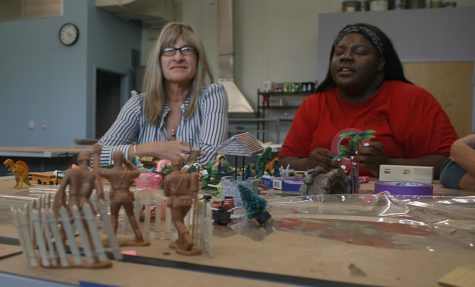400th commemoration continues in Doudna
September 10, 2019
Amber Johnson, an Associate Professor of Communications at Saint Louis University brought in three experiences for students, faculty and community members at Eastern’s campus on Tuesday.
Johnson’s events focus on the idea of radical imagination and radical forgiveness.

Anita Shelton, the dean of the College of Liberal Arts and Sciences, and Dominique Brown, senior majoring in psychology, both were working as a group to create their version of an Utopia without political injustice and racism during “Radical Imagination and Radical Forgiveness: Workshop on Intersectional Injustice,” at the Tarble Arts Center on Tuesday afternoon.
Johnson is also responsible for creating the Justice Fleet in 2016, following almost 10 years of doing the radical forgiveness program in their own classroom.
“The Justice Fleet is a mobile social justice museum that fosters healing through art, dialogue and play.” Johnson said.
The group brings in different activities to engage with communities and inspire conversations to promote healing, Johnson said.
“If you don’t heal from systemic injustice, all of your efforts towards ending them will probably result in new injustices,” Johnson said.
The first activity of the day started at 1 p.m. in the Doudna lobby and asked participants to paint their bias and ask for forgiveness, or paint how others have been biased towards them and grant forgiveness.
The canvases are then sewn together to create “forgiveness quilts”, so that those involved can see that their biases and forgiveness exist as a part of a whole.
Displays around the lobby outlined an entire curriculum set up on what radical forgiveness is and what it means to forgive.
“We have to heal from our traumas or we run the risk of reproducing them,” Johnson said.
The second activity was radical imagination, which brought participants into the Tarble Arts Center to participate in play activities, which was facilitated by Johnson and Zachary Taylor, a communications graduate student at Saint Louis University.
Participants separated themselves into groups and were given a box full of various toys and figurines and were asked by Johnson to create an imaginary community with the parts, in which class and economic disparity was addressed, as well as race and gender inequality.
They were asked to imagine radically, with no limits.
“Whatever you say goes,” Johnson said at the start of the workshop. “Nothing is impractical.”
The final event of the day was a presentation at 7 p.m. in the Doudna Theater by Johnson, who talked about the different levels of, not just social justice, but also social injustice.
Johnson stressed that doing your best to be aware of your thoughts only goes so far.
“Mindfulness is important in social justice, but it will never be enough,” Johnson said.
They used the metaphor of hosting a dinner party on how to be radically inclusive.
The first step is to ask people from the start if they want to be included and how they want to be included Johnson said, and then work with different people along the way to find solutions.
Johnson wants to “shift the disposition and humanize equity.”
At the end of their talk they answered audience questions and provided a list of things that people can do if they want to better understand how radical forgiveness works and where to start in their daily lives.
Zoë Donovan can be reached at 581–2812 or at [email protected].


















































